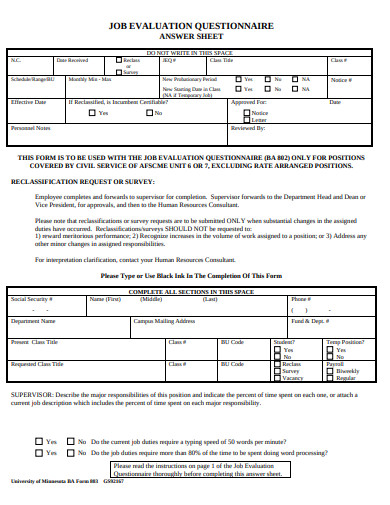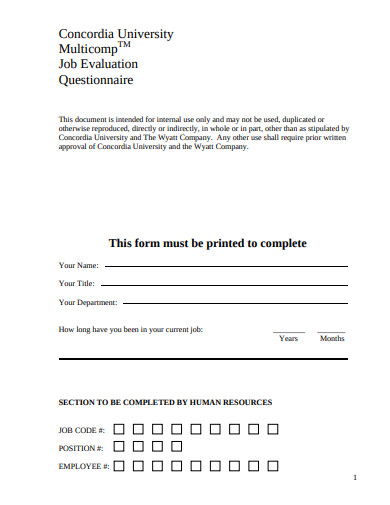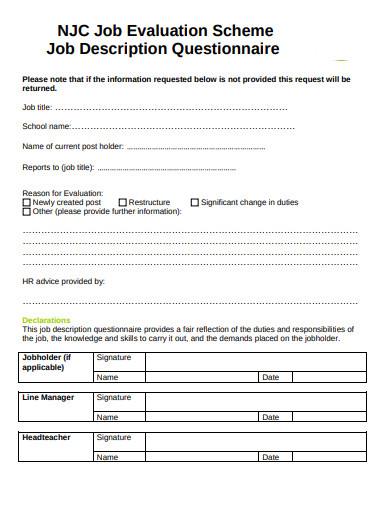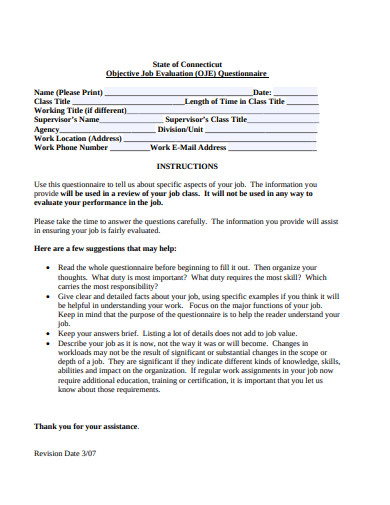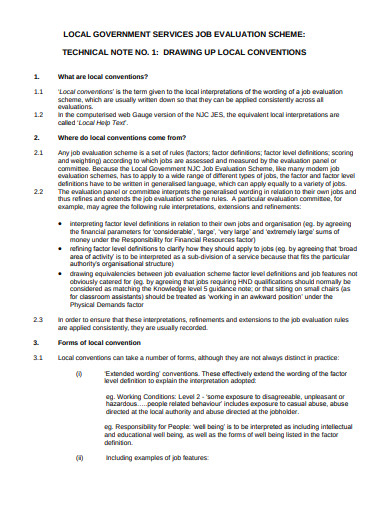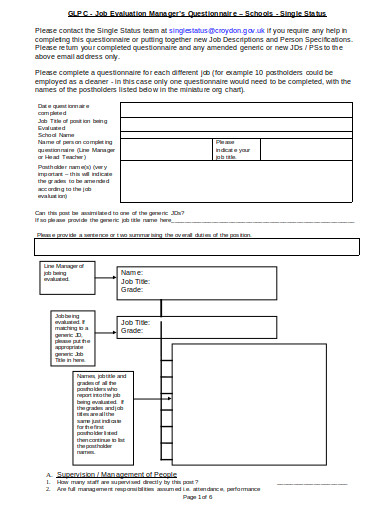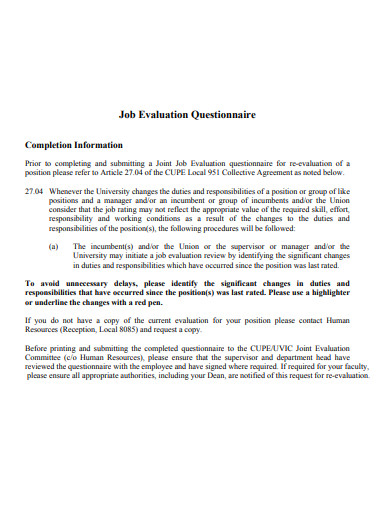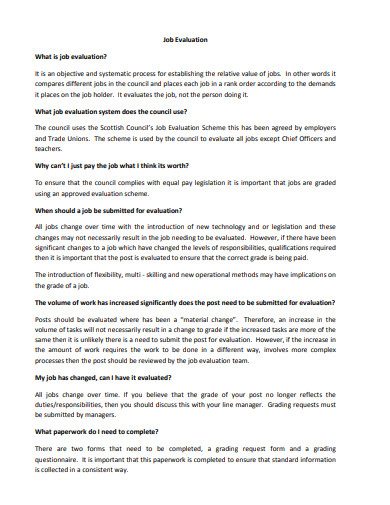8+ Job Evaluation Questionnaire Examples to Download
While everyone’s job is important for the good of the company, how do you ensure that each job is recognized and valued for what it is worth? Undervaluing and overvaluing roles in the company can affect employee performance, productivity, retention, as well as company resource distribution. To safeguard the interest of the business, employers should conduct job evaluations to appraise the different operations in their system.
Job evaluations are a job appraisal process in a business or an institution. Employers use the results as a basis for appropriating pay rates to their employees. The process is different from job analysis since the latter is an examination of the nature and responsibilities that a job entails to make a relevant and specific job description. To perform the evaluation, employers or a designated management team provides a concise survey questionnaire that reflects the nature and function of a job. And the document is used to assess the value of a job to the company and appropriate a compensation package.
There are several instances when job evaluation is necessary. For example, company X integrated software that automatically accounts and audits the money coming and going out of the company. This will change the job specifications in the finance department. They might be given fewer tasks or more responsibilities. The tech can also create a new work role to be filled in. Or the manager assigned Karen new tasks outside her original job description. It would be unfair to the Karens of the company to still receive the same pay as her co-workers who don’t juggle the same workload. You have to know how to equitably compensate these people for the work they put in.
Equality Vs. Equity
The goal of job evaluations is to generate an impartial basis for a compensation plan catering to the circumstances of the job. The jobs in the company are analyzed through different evaluation methods. In a company, people are performing various tasks at different levels of urgency, difficulty, and expertise required. A generalist type of job such a general doctor would not handle work meant for a specialist type job such as a neurosurgeon. Adopting an equal compensation system that distributes the same pay to the employees would not be fair. An equitable compensation system is born from an understanding of the prerequisites and functions of each job and its contribution to the company.
Value In Job Evaluations
In starting an independent, management, or board evaluation, it is wise to collect the necessary information from your employees. Aside from designing and implementing an equitable compensation system, job evaluations help improve employee satisfaction in your company. When your people are disloyal because there is no cause to be, your company is vulnerable to internal tensions and disputes. With job evaluations, employees get job-specific assignments and tasks. They also enjoy fair job promotions and career opportunities. When the employees feel that their role, inputs, and contribution to the company are valued, they are less likely to look for greener pastures in other companies because of a lack of better opportunity, stunted career growth, and neglected potential.
Job evaluations also help design job specifications, operation standards, and performance appraisal criteria. Reviewing an employee’s performance should depend on objective criteria, which will be established by evaluations. There will be less room for biases and prejudice in the company. Employee recruitment is also less daunting because there is already a set standard or job prerequisites that a job candidate has to fulfill. Job evaluations enable a systematic decision on pay rates and further negotiations or appeals, as well.
8+ Job Evaluation Questionnaire Examples
Job evaluation questionnaires are one way to start the process. You can ask their employees regarding their inputs about their job. You can ask about their satisfaction with the company, as well as other observations that will help with evaluation. The right survey questionnaire can help you arrive at the right conclusions. The results of the evaluation wouldn’t be useful if it doesn’t reflect the real situation. Therefore, whether you are a part of the company or a disinterested external consultant, you have to refine your questionnaires.
1. Job Evaluation Questionnaire Answer Sheet
2. University Job Evaluation Questionnaire
3. Job Evaluation Scheme Questionnaire
4. Job Evaluation Questionnaire Method Points
5. Objective Job Evaluation Questionnaire
6. Government Services Job Evaluation Scheme Questionnaire
7. Job Evaluation Managers Questionnaire
8. Simple Job Evaluation Questionnaire
9. Basic Job Evaluation Questionnaire Example
What Is In A Questionnaire?
To help determine the worth of a job to the company, you can refer to how the management sees the job and to how the employee sees his or her job position. The management can look into the job’s difficulty, degree of specialization and knowledge required, supervisory and managerial responsibilities, and working conditions as the factors for deciding the job’s worth to the company. These elements can help decide if the employee is being given the appropriate compensation package. Therefore, questions that answer to these elements should be presented well in your questionnaire.
1. Job Difficulty
Questions under this section reflect the challenges and demands of the job to the employees. The job can be simple or complex, depending on the duties and responsibilities required. It may require intense physical effort and energy. The job may also demand an exhausting exertion of mental effort for planning, analysis, and creative input. The responsibility may require certain factors to make the necessary decisions and judgments.
2. Skill Prerequisite
The position, along with its duties and responsibilities, may demand a specific set of knowledge, skills, and extensive technical know-how that an average person doesn’t have. Any job candidate may have to finish higher education and earn a master’s or a doctorate to perform the job’s function adequately. The person may be required to have completed a certain track in education or possessed several years of related experience.
3. Supervisory Tasks
This factor determines the managerial or supervisory tasks necessary for a job and those that are performed by the employee. It could be an informal and infrequent part of the job description, such as managing a small team for a month-long company event. It can also be that the supervisory tasks of a job include training and hiring of employees. Or the person manages a large number of people and other supervisory personnel as his or her main function. The administrative duties involved are more complicated, such as planning, budgeting, and regulation.
4. Working Conditions
The average and prevalent working conditions of the employees should also be considered. For instance, they could be frequently exposed to carcinogenic chemicals. They could be working in a dangerous neighborhood. Their job may put them at a high probability of workplace risks and accidents. Their job may be a personal safety and health hazard. The employees may be exerting a considerably large degree of physical and mental effort to adequately perform the job.
Job evaluation questionnaires filled in by your employees help you gain an insight into the company’s treatment of its members. Based on the results of the evaluation, the employee may be entitled to a raise or a better compensation package. By knowing the net value of the job, you will avoid underappreciating employees and paying more than you should. It will save your company in the long run.



